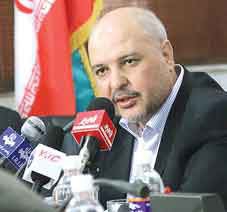Monday 29 October 2012 - 14:49
Story Code : 8977
Iran MP urges use of oil weapon against West in response to sanctions
Former Iranian oil minister Masoud Mirkazemi, who heads parliament's energy committee, urged current oil minister Rostam Ghasemi to consider using oil as a weapon against the West in response to sanctions against the OPEC state.
"Energy as a tool in Iran's hand is a threat against its enemies," Mirkazemi, a prominent member of parliament, was quoted as saying by semi-official news agency Mehr.
"The Westerners must know that if they want to use this tool politically, there is this possibility that this tool be used against them some day and they, not the Islamic Republic, will lose," he said.
The semi-official Fars news agency said Mirkazemi and his committee had met Ghasemi to discuss this issue and ways to deal with the sanctions.
"In the meeting with Mr Ghasemi, we stressed that we should not allow the United States and some Western countries to use oil, which is Iran's own tool, against Iran," Mirkazemi said.
"We suggested to Mr Ghasemi to pursue the issue in OPEC of the use of oil as a political tool by some Western countries and the US because oil is not a political tool, and if it is, Iran can make the best use of it," the former oil minister said.
"We asked the minister to warn those who imposed the oil sanctions that if the anti-Iranian policies and the use of oil as a political tool continue, Iran as one of the main oil producers in the world, will challenge the whole of Europe by using oil as a political tool," he said.
Mirkazemi said the oil minister has welcomed the committee's suggestions.
The European Union banned the import of Iranian crude oil by its member states from July 1 and recently extended the ban to gas exports, in addition to a host of other sanctions that have had an impact on the transportation of Iranian cargoes and the provision of insurance cover.
While the EU sanctions have had an impact beyond Europe, US sanctions targeting Iran's central bank have also led to a fall in exports to other markets, mainly in Asia, as refiners were forced to cut imports of Iranian crude oil in return for waivers from the financial sanctions that would have barred their countries from the US financial system.
Mehr quoted Mirkazemi as saying that although the sanctions have had some impact on oil exports, Tehran was coping with fluctuations in its oil export levels. He suggested that one way to cope with the effect of the sanctions on revenues was to cut Iran's dependence on oil sales.
Some members of parliament have been working on a bill that would ban the government from selling oil in the future to countries that have led the sanctions effort, Mirkazemi has said previously.
Parliament has been calling on the government to base next year's budget to lower income from oil sales.
The government has said that income from oil exports accounts for only 20% of total budget revenues though independent economists believe the figure was higher at 60% before the latest sanctions led to a fall in oil exports and revenues.
The latest Platts survey of OPEC's production estimated Iran's output in September at 2.7 million, a 1 million b/d decline from last year's average of 3.7 million b/d.
The Iran Project is not responsible for the content of quoted articles.
# Tags











